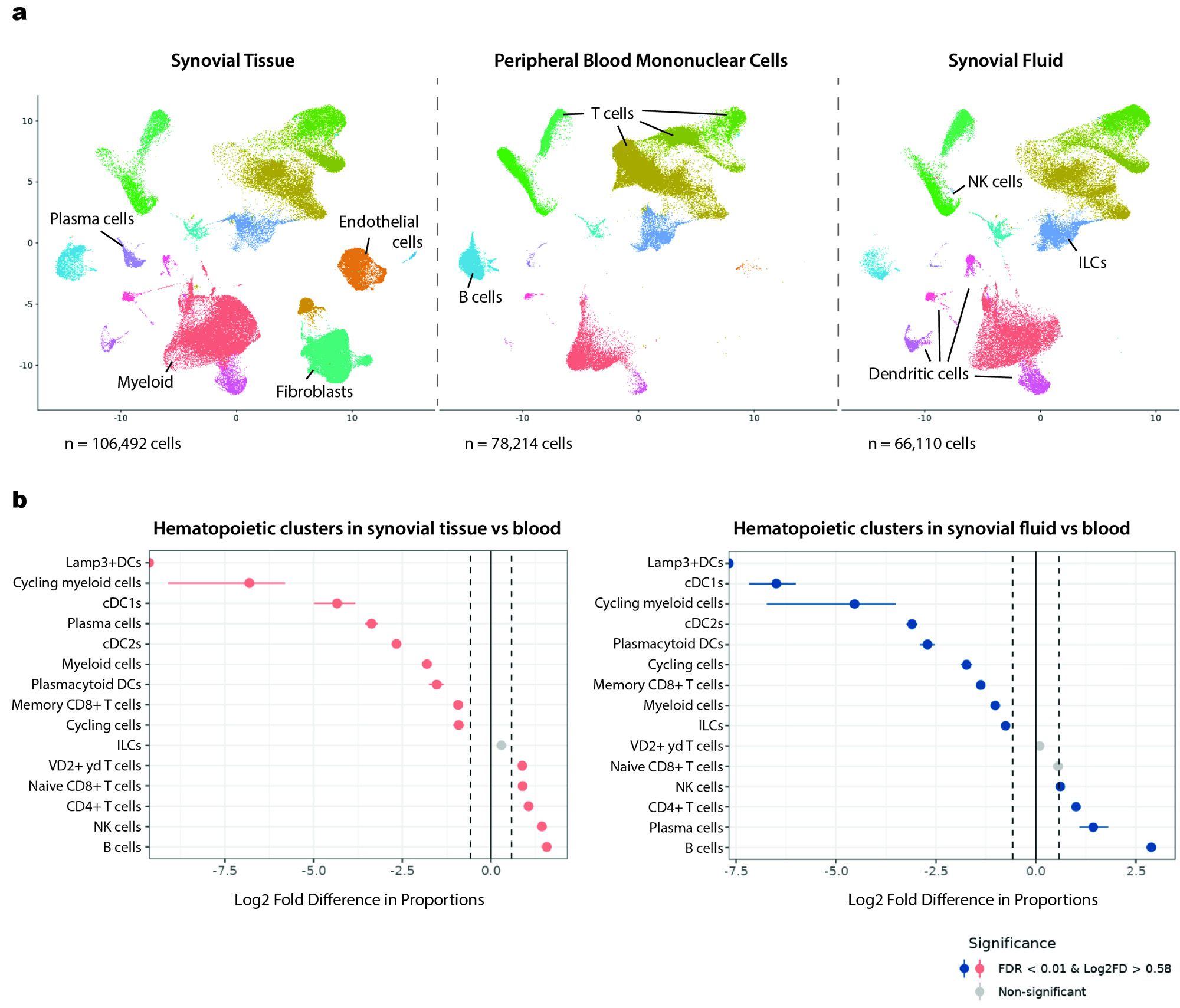Session Information
Session Type: Abstract Session
Session Time: 4:00PM-5:30PM
Background/Purpose: Understanding the unique and shared pathogenic processes between childhood-onset and adult-onset inflammatory arthritides is needed to guide more effective drug development and their application to different age groups. Difficulties in accessing samples from the inflamed tissue site in children has limited our understanding of disease mechanisms that operate locally in the joint. As part of the Tissue Research in Childhood Onset Inflammatory Arthritis (TRICIA) Consortium, we have established the first single cell multi-omic atlas of the inflamed joint in Juvenile Idiopathic Arthritis (JIA).
Methods: Ultrasound-guided needle biopsies of synovial tissue, with matched synovial fluid and peripheral blood mononuclear cell samples were obtained from n=12 pediatric patients with JIA, who were naïve to disease-modifying anti-rheumatic drugs. Multimodal single-cell characterisation of cells (n = 250, 816 cells, with scRNA-seq, VDJ-sequencing and TotalSeq surface assays) and multiplexed imaging of synovial tissue fragments were performed.
Results: Transcriptomic profiles of hematopoietic cells at a global level of clustering revealed that synovial tissue and synovial fluid were proportionally enriched in the same cellular subtypes (dendritic cell subsets, myeloid and memory CD8+ T cells) compared to blood ( > 0.58 log2 fold difference, FDR < 0.01, Fig 1). Core tissue-enriched populations identified in adult rheumatoid arthritis (Zhang et al., 2022, the AMP RA/SLE network) were also prominent in pediatric synovial tissue samples, including GZMK+ memory CD8+ T cells, CXCL13+ CD4+ T peripheral helper cells and NR4A+ germinal centre-like B cells. Evidence for a distinct immune environment of the synovial fluid cavity relative to synovial tissue included upregulation of interferon-response genes, greater proportions of dendritic cells (Fig 1), less diversity of αβ T cell receptors on CD8+ T cells (P = 0.02) and more hyperexpanded CD8+ T cell clones: 13.6% of total T cells in synovial fluid had the same clonotype in ≥ 20 cells, compared to 3.8% in synovial tissue (n = 8091 and 7039 cells respectively).
Conclusion: Our work implicates the synovial fluid cavity in disease pathogenesis, with synovial fluid providing a reservoir of free-flowing activated cells as barrier integrity breaks down. Despite distinct disease features and physiology, our analysis identifies shared cellular phenotypes within inflamed synovium between children and adults. This suggests that certain pathogenic mechanisms extend across the age-spectrum in inflammatory arthritis, enabling a more informed approach to clinical trials in children in the future.
References: Zhang, F. et al. (2022) ‘Cellular deconstruction of inflamed synovium defines diverse inflammatory phenotypes in rheumatoid arthritis’. bioRxiv, p. 2022.02.25.481990. Available at: https://doi.org/10.1101/2022.02.25.481990.
a) Integrated scRNA-seq global UMAP of major cellular clusters and their b) proportional difference between different specimen types, with bootstrap confidence intervals shown (10,000 permutations).
To cite this abstract in AMA style:
Bolton C, Mahony C, Smith C, Alexiou V, Nguyen H, Reis-Nisa P, Lomholt S, Hackland A, Sultan S, Kupiec K, Davda S, Foley C, Dendrou C, Rosser E, RA SLE Network A, Jonsson A, Zhang F, Brenner M, Raychaudhuri S, Buckley C, Thyagarajan M, Shiekh Z, Compeyrot-Lacassagne S, Chippington S, Coles M, Al-Abadi E, Filer A, Inflammatory Arthritis (TRICIA) Consortium T, Wedderburn L, Croft A. Title: Inflammatory Arthritis Across the Age-Spectrum: Single-Cell Profiling of the Inflamed Synovium in Children with Juvenile Idiopathic Arthritis [abstract]. Arthritis Rheumatol. 2023; 75 (suppl 9). https://acrabstracts.org/abstract/title-inflammatory-arthritis-across-the-age-spectrum-single-cell-profiling-of-the-inflamed-synovium-in-children-with-juvenile-idiopathic-arthritis/. Accessed .« Back to ACR Convergence 2023
ACR Meeting Abstracts - https://acrabstracts.org/abstract/title-inflammatory-arthritis-across-the-age-spectrum-single-cell-profiling-of-the-inflamed-synovium-in-children-with-juvenile-idiopathic-arthritis/

